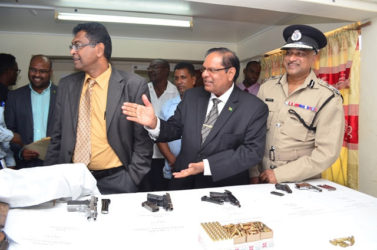President David Granger says he would like to see fewer guns in the hands of private citizens.
“We would like to see fewer weapons in the hands of private citizens. This is my personal view—that weapons should be used by law enforcement agencies, such as the Guyana Police Force and the Guyana Defence Force,” Granger said in response to a question during this week’s recording of the Public Interest interview programme.
The president was asked whether he thinks the sight of persons who are usually armed with guns to guard businesses has a psychological effect on young adults and whether his administration would be addressing it.

“Yes, we are addressing it. There are two types of guns–illegal and legal guns. And you might have been seeing legal guns on display at businesses concerned with diamond and gold,” he said.
With respect to legal firearms, Granger noted that there have been reports of legitimate firearm licence holders renting their weapons to criminals. “Criminals who will go and rob someone and maybe give them a part of the booty,” he said, before adding that the Ministry of Public Security is trying to reduce the “frequency of the ease” with which people can get guns.
He also stressed that once the guns have been used in illegal activities, they would be seized and it would be much more difficult to get another licence.
Granger also said more focus needs to be paid to the security of the borders to ensure that the amount of illegal firearms coming into the country is drastically reduced. “Our biggest problem is the fact that we have an 1,100 km border with Brazil, which is one of the world’s largest producers and exporters of small arms and many of the illegal weapons are traced to Brazil so the security of our borders is one matter,” he said, while adding that the effects of illegal firearms could be reduced by enforcing stricter border control through area surveillance, mounted police and even drones that will be used to detect persons who are entering the country.
Granger also mentioned the deployment of wardens who will have law enforcement powers in the gold, timber and tourism sectors to provide protection and to detect people who have illegal firearms and to bring them to justice. “So there is a plethora of measures that will be implemented and the policy is aimed at getting guns off the street,” he added.
Last year, Minister of Public Security Khemraj Ramjattan introduced a gun amnesty programme aimed at reducing the number of illegal guns on the streets, in the wake of an increase in gun-related crimes. At the conclusion of the amnesty in mid-October, the Guyana Police Force declared it to be a huge success, with over 170 weapons being handed over as well as a large quantity of ammunition.




